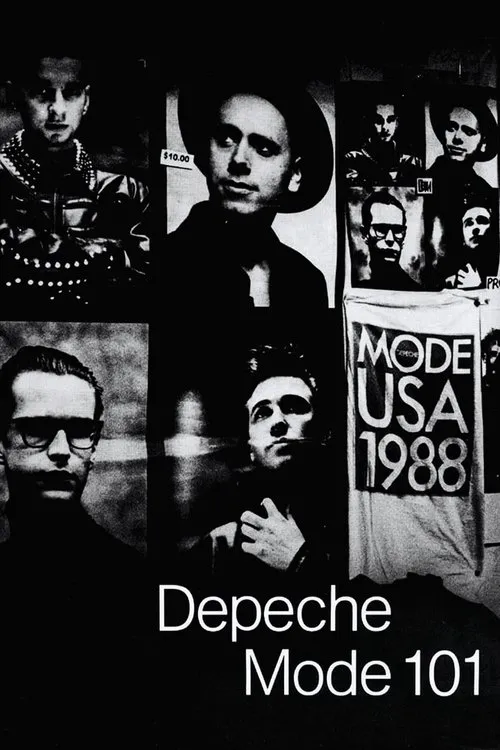Depeche Mode 101

Plot
In the midst of Depeche Mode's 1988 American tour, which marked a pivotal moment in the band's storied history, director D.A. Pennebaker set his lens to capture the behind-the-scenes realities of both the art and business involved. The resulting film, titled 101, offers a candid and unvarnished portrayal of the British synthesizer band's experiences on the road. The title itself, '101', was chosen in reference to the first show on their tour at the Roseland, in New York City, where approximately 101 sold-out shows were planned. The documentary chronicles the band's journey from the first show to the last, revealing the intricate dynamics at play in their creative process, business dealings, and interpersonal relationships. From the outset, 101 provides an intimate, often humorous glimpse into the band's rehearsals and preparations for their upcoming shows. Viewers witness Dave Gahan's distinctive vocals and Martin Gore's innovative songwriting, as well as Andy Fletcher and Alan Wilder's behind-the-scenes efforts, ensuring the band's continued commercial success. Meanwhile, Pennebaker captures the dynamic, high-energy atmosphere on and off stage, showcasing the camaraderie and creative synergy that has helped define Depeche Mode. As the tour progresses, 101 shifts its focus to the often-overlooked business side of the music industry. With an all-access pass to Depeche Mode's inner workings, the documentary follows the band as they navigate the complexities of their record label, Mute Records, and the commercial pressures exerted by Columbia Records, who are keen to capitalize on the band's global success. These scenes offer a unique perspective on the symbiotic relationship between creativity and profit in the music industry, underscoring the intricate web of interests at play. The 101 film further explores the band's personal relationships, showcasing the distinct personalities that have contributed to Depeche Mode's enduring success. Martin Gore's introspective and somewhat introverted nature is juxtaposed with Dave Gahan's charismatic stage presence and Andy Fletcher's unflappable dry sense of humor, while Alan Wilder's behind-the-scenes role serves as a testament to his unacknowledged yet crucial contributions to the band. Throughout 101, Pennebaker's unobtrusive filmmaking style proves effective in capturing the authenticity of Depeche Mode's experiences. By eschewing dramatic narrative or contrived conflict, the director instead focuses on the everyday realities of life on tour: the tension between rest and rehearsal, the strain on relationships between band members, and the constant push to create innovative music within the constraints of commercial and artistic pressures. The film also touches upon the band's evolving image, from their post-punk origins to their increasingly commercial success. As Depeche Mode navigates their new status as international superstars, they must confront the risks of image manipulation and the commodification of their creative output. In doing so, 101 raises essential questions about the very nature of artistic integrity and the commercial imperatives that often accompany success. Depeche Mode's 1988 American tour was not only a significant commercial success but also a testament to the band's creative resilience and their commitment to pushing the boundaries of their art. In capturing the band's journey from the first show to the last, 101 offers an invaluable, behind-the-scenes glimpse into the realities of art and business in the music industry, raising essential questions about the complex interplay between creativity, profit, and artistic integrity.
Reviews
Recommendations




